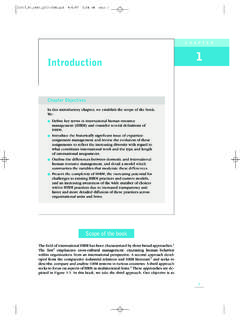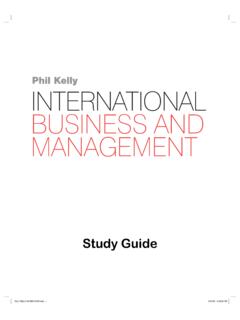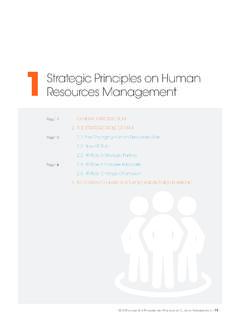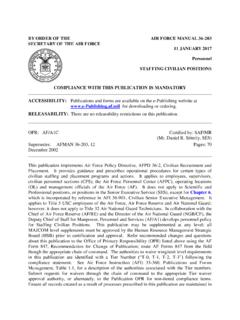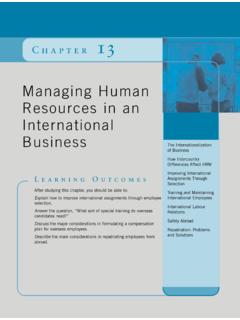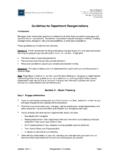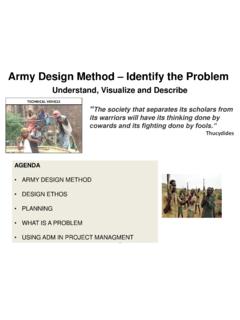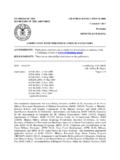Transcription of CHAPTER Recruiting and selecting 5 staff for …
1 109 IntroductionHiring and then deploying people to positions where they can perform effectivelyis a goal of most organizations, whether domestic or international. Recruitment isdefined as searching for and obtaining potential job candidates in sufficient num-bers and quality so that the organization can select the most appropriate people tofill its job needs. Selection is the process of gathering information for the purposesof evaluating and deciding who should be employed in particular jobs. It is impor-tant to note that recruitment and selection are discrete processes and bothprocesses need to operate effectively if the firm is effectively to manage its staffingprocess.
2 For example, a firm may have an excellent selection system for evaluatingcandidates but if there are insufficient candidates to evaluate then this selection sys-tem is less than effective. Both processes must operate effectively for optimalstaffing decisions to be made. We shall return to this point later in the of the major differences between domestic and international staffing arefirst that many firms have predispositions with regard to who should hold key po-sitions in headquarters and subsidiaries ( ethnocentric, polycentric, regiocentricand geocentric staffing orientations) and second, the constraints imposed by hostgovernments ( immigration rules with regard to work visas and the commonChapter ObjectivesThe focus of this CHAPTER is on recruitment and selection activitiesin an international context.)
3 We will address the following issues: The myth of the global manager. The debate surrounding expatriate failure. Factors moderating intent to stay or leave the internationalassignment. Selection criteria for international assignments. Dual career couples. Are female expatriates different? Recruiting and selectingstaff for 9/7/07 12:15 PM Page 109requirement in most countries to require evidence as to why local nationalsshould not be employed rather than hiring foreigners) which can severely limit thefirm s ability to hire the right candidate. In addition, as Scullion and Collings1note,most expatriates are recruitedinternallyrather than externally, so the task ofpersuading managers (particularly if they are primarily working in a domesticenvironment) to recommend and/or agree to release their best employees for in-ternational assignments remains a key issue for international HR this CHAPTER , we will explore the key issues surrounding international recruit-ment and selection, with a focus on selection criteria.
4 Implicit in much of the dis-cussion and research about selecting staff for international assignments is thatthere are common attributes shared by persons who have succeeded in operatingin other cultural work environments that is, the so-called global manager. Ourdiscussion on this topic centers around four myths: that there is a universalapproach to management; that all people can acquire appropriate behaviors; thereare common characteristics shared by global managers; and there are no impedi-ments to global staff mobility. We then consider various factors such as expatriatefailure, selection criteria, dual career couples and gender that impact on themultinational s ability to recruit and select high calibre staff for deployment inter-nationally.
5 For convenience, we will use the term multinational throughout thischapter, but it is important to remember that the issues pertain variously to allinternationalizing companies regardless of size, industry, stage in international-ization, nationality of origin and geographical diversity. We continue to use theterm expatriate to include all three categories: PCNs (parent-country nationals),TCNs (third country nationals) and HCNs (host-country nationals) transferred intoheadquarters operations, although much of the literature on expatriate selectionis focused only on PCNs. Issues in staff selectionThe myth of the global managerMultinationals depend on being able to develop a pool of international operatorsfrom which they can draw as required.
6 Such individuals have been variouslylabeled international managers or global managers . The concept of a globalmanager appears to be based on the following myths or 1: there is a universal approach to view that there is auniversal approach to management persists, despite evidence from research to thecontrary, and many multinationals continue to transfer home-based work practicesinto their foreign operations without adequate consideration as to whether this isan appropriate action. The persistence of a belief in universal management maybe evidence of a lingering ethnocentric attitude or perhaps an indicator of inex-perience in international operations.
7 However, as we discussed in CHAPTER 1 inrelation to the convergence divergence debate, work practices have, to a certainextent, converged through the transfer of technology and best practice and thisprocess is supported by the global spread of management education programsthat reflect the dominant Western approach to management. Linked to thisprocess is the belief in the power of organizational culture as a moderator ofcultural differences in the work setting. 110 CHAPTER 5 Recruiting AND selecting 9/7/07 12:15 PM Page 110 Myth 2: people can acquire multicultural adaptability and can adopt culturally appropriate behaviors but that does not apply all thetime in all cultural depends, as we will examine later, on the individ-ual s reaction to a particular cultural environment, as it is not always easy to putinto practice what you know is the right way to behave and some individuals havemuch better effectiveness and coping skills than skills are de-fined as the ability to successfully translate the managerial or technical skills intothe foreign environment, whereas coping skills enable the person to become rea-sonably comfortable.
8 Or at least survive, in a foreign environment. Those who areable to function adequately in other cultural settings may be regarded as havinggood effectiveness and coping skills. As we examine later in this CHAPTER , culturaladjustment has been linked to expatriate performance and influences how inter-national assignments are 3: there are common characteristics shared by successful body of literature on expatriate selection tends to reflect thisapproach, as we will explore in the next section of this CHAPTER . It is possible toidentify predictors of success, in that a person who has certain characteristics,traits and experience is more likely to perform effectively in foreign environmentsthan a person who does not share this profile.
9 However, this has to be counteredby other factors involved not just in the selection process, but also in the way theperson responds to the foreign location. It is also unclear how the identified pre-dictors of success should be measured. Myth 4: there are no impediments to have mentioned that partic-ularly large multinationals are endeavoring to develop and exploit an internallabor market from which expatriates international managers can be drawn. AsForster4points out, firms may have become more global in their operations buttheir people have not. The barriers to furthering a geocentric staffing policy staffavailability, time and cost constraints and host-government requirements revealhow the multinational s ability to deploy what may be the best person into a par-ticular position can be curtailed.
10 That some multinationals are experimenting withalternatives such as the virtual assignment is indicative of this constraint. Compounding the above myths is the way in which the term global manager issometimes used to describe a person who has a global mindset , though often in-ternational experience is a prerequisite for building the global perspectiverequired. Baruch5argues that there is no consistent way to characterize a globalmanager. He suggests that the basic qualities commonly listed intelligence, mo-tivation, adaptability and entrepreneurship are the same requirements for anysuccessful manager today.




